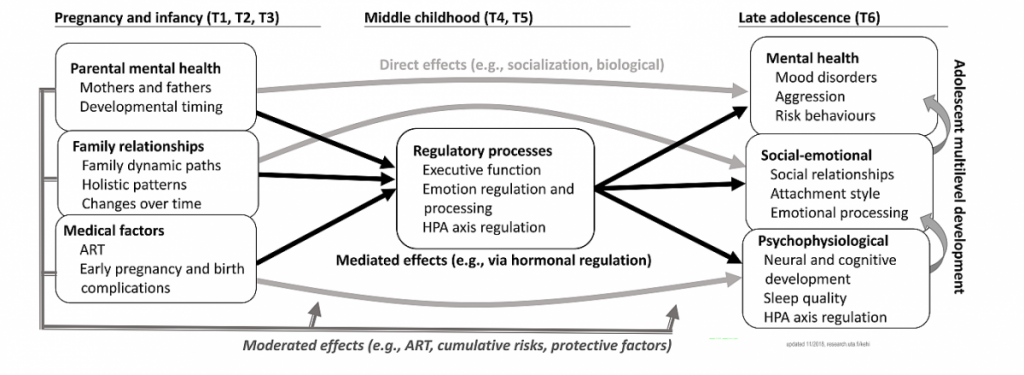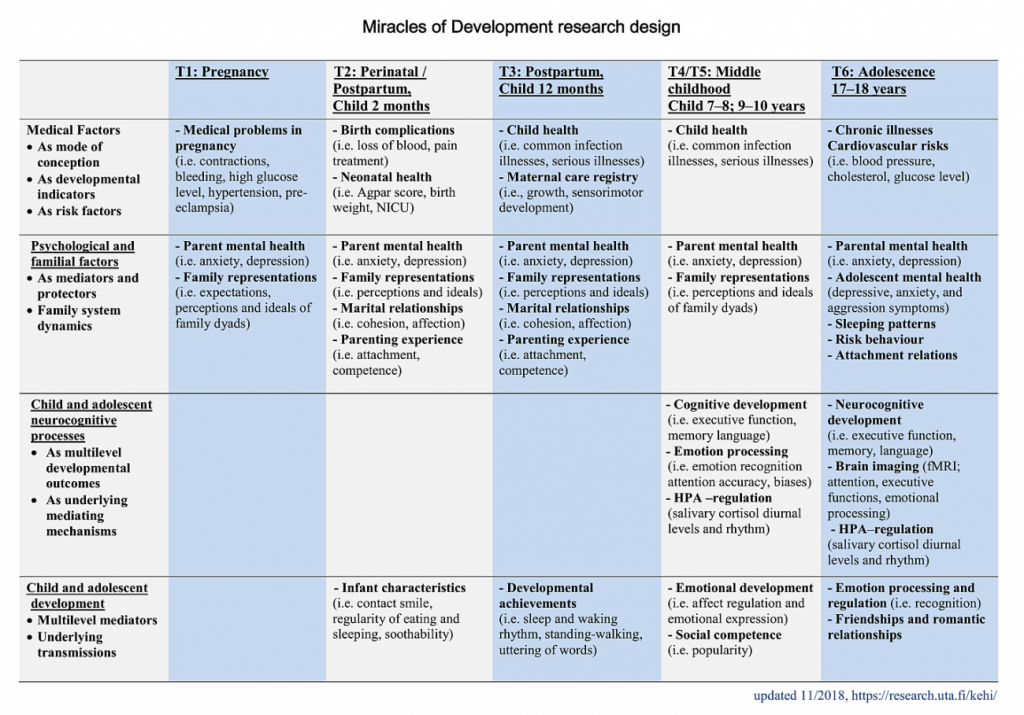Our research aims to answer three fundamental questions of developmental science that are still open to debate: How and why do early experiences influence our lives from infancy to adulthood? How do the social, emotional, cognitive and psychophysiological developmental domains interact to predict future development? And how and why do early biological and obstetric characteristics underlie mental health and development across the human life-span?
To answer these questions we followed 750 Finnish families from pregnancy (2nd trimester) through infancy (child age of two and twelve months) and middle childhood (child ages of 7-8 and 11 years) to late adolescence (child age of 17-19-years). The research setting involves five prospective questionnaire study waves, providing data on medical and health-related factors, family relationships and mental health as well as child social-cognitive development. In addition, we have three substudies from middle childhood and late adolescence, providing data on cognitive-emotional processing, stress system functioning, brain functioning (fMRI) and observed parent-adolescent interaction.
Figure 1 below shows the conceptualization of the study. The concepts and assessments of the multidisciplinary prospective research setting are summarized in Figure 2 (see at the end of this page).
Figure 1. Conceptual design of the research
Current Research Interests
The main research interests concerning the role of early experiences on life-span development include the long-term impacts of pregnancy, birth and postnatal medical, psychological, and social environments on child and adolescent development and mental health. We are currently analysing associations of early experiences and late adolescent development and functioning, with additional interest in the mediating role of middle childhood psychosocial and regulatory processes. The specific questions are, e.g., How do early parental mental health, family relationships and medical factors predict adolescent psychophysiological and social-emotional development and mental health? Does timing of early parental mental health and family relationship problems (at pregnancy, early infancy and late infancy) matter in predicting specific developmental and mental health problems in middle childhood and adolescence? Furthermore, we are modelling the cognitive and emotional processes in middle childhood mediating the impacts of early experiences on adolescence.
Intruiging questions concern complex, mutual interactions between social, emotional, cognitive and psychophysiological domains of development. We attempt to understand how automatized underlying mechanisms, such as implicit emotion recognition (face paradigm) contribute to child mental health in different early family environments. Further research foci are the ways how early environment may predict alterations in psychophysiological stress regulation in middle childhood, i.e., levels and the diurnal rhythm of HPA cortisol secretion, and the ways how emotion regulation in middle childhood mediates the early experiences on mood, sleep and regulatory processes in late adolescence.
Considering the role of medical and obstetric factors in human development, we analyze how former infertility and assisted reproductive techniques (ART) may influence mental health and social-emotional, cognitive and psychophysiological development until adolescence. We further focus on interactions between medical risks, such as preterm birth, need for intensive care and low birthweight and social and emotional experiences. The specific tasks are to analyze how combined medical, familial, and psychological early predictors explain ART adolescents’ social-emotional development and physiological stress regulation, sleeping patterns, and brain activity indicators. Further, how do infertility (cause and duration) and treatment features predict ART adolescents’ brain, neurocognitive, and social-emotional development?
In the Parent-Adolescent –interaction substudy we are curious to know, how family members influence each other in behavioral and physiological activation and regulation under socially stressful situations. The study includes mothers and adolescents in naturalistic contexts. The research tasks are, e.g., to analyze the features of mother–adolescent interaction and mother–adolescent stress physiology, and to model how different physiological stress systems function within an individual and within the mother–adolescent dyad. The substudy also inquires whether and how early family psychosocial risk factors predict mother–adolescent interaction, psychophysiological stress reactivity and regulation, and adolescent cognitive functioning.
In adolescence, intensive structural and functional reorganization of the brain underlies changes in behavior and social relations. To better understand developmental brain functions and their early antecedents, the Brain research substudy investigates the neural basis of complex cognitive functions, such as executive functions, emotion regulation, and affective processing, using the Functional Magnetic Resonance Imaging (fMRI) protocol. Brain research substudy is a part of the Developing Mind and Brain consortium with five other adolescent cohorts that provide basic and novel information on the factors associated with functional and structural aspects of brain systems and how they continue mature into early adulthood.
Theoretical and Practical Significance
In theoretical terms, our multimethod, multisite, and multidisciplinary prospective research combines epidemiological, interactional, psychophysiological and brain research and explores familial and psychosocial mechanisms underlying child and adult development and health. It poses novel questions about the role of early foetal and infancy experiences in human development by comprehensively conceptualizing the early-life medical, psychological, and familial factors. It also provides renewed methods to test and model multilevel underlying mechanisms in mental health and development. Concerning the medical issues, the research illustrates how the new reproductive techniques and obstetric issues may carry into adolescence, and analyses the psychosocial and medical underlying paths.
In practical terms, we provide knowledge about early developmental risk and protective factors. That is pivotal in consulting families with medical, relational, and psychological risks, as well as all families about multiple factors contributing to children and adolescence well-being. That knowledge is also highly practical in adolescent psychiatry, contributing to tailoring evidence-based treatments and interventions. We hope that results of our diverse and dynamic underlying mechanisms benefit parents who often worry about impacts of single risks. Providing psychological support and help to couples in transition to parenthood can make a crucial impact on maternal-foetal prenatal regulatory development as well as early dyadic and family interactions.


